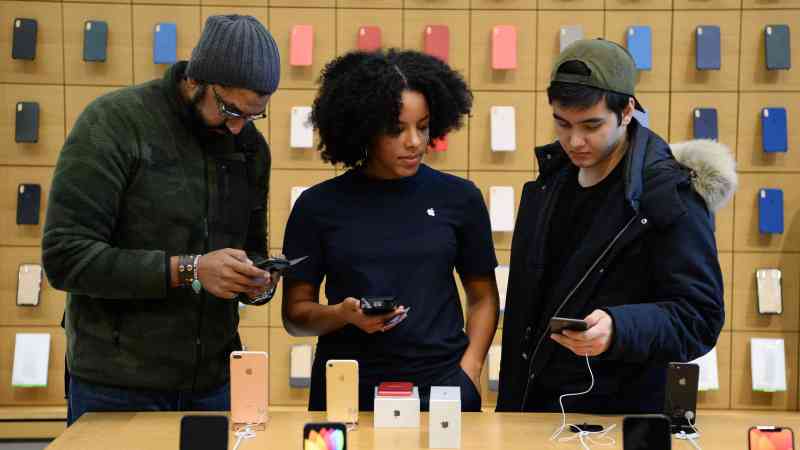Apple warns watchdog over ‘flawed’ mobile browser investigation
Apple has warned Britain’s competition watchdog that its “flawed and insufficient” analysis of the iPhone maker’s dominance in the mobile browser market risks harming consumers and developers.
The Silicon Valley tech group claimed the Competition and Markets Authority was using outdated information and “unsubstantiated assertions” from a developers “rather than objective evidence” in its investigation.
The CMA is investigating the supply of mobile browsers and browser engines, as well as the distribution of cloud gaming services through app stores on mobile devices in the UK.
Apple and Google supply the two main mobile operating systems in the UK: iOS and Android respectively.
Apple’s Safari and Google’s Chrome are the most common browsers on mobile devices.
On iOS, all browsers are required to be built on the version of Apple’s WebKit browser engine.
In an update on its competition investigation published in June, the CMA said a “lack of competitive pressure is likely to reduce Apple’s incentives to improve WebKit”.
It said that the WebKit restriction meant browser vendors “are less able” to add features and improvements to their browsers on iOS compared with “less restricted platforms” such as Android or desktop.
• Competition watchdog has ‘real concern’ over big tech’s AI dominance
The CMA said it had obtained evidence indicating that browser vendors faced additional costs from having to develop and support a version of their browser based on WebKit.
Commenting on the findings, in a response published by the CMA on Tuesday, Apple reiterated that the WebKit restriction was necessary to ensure the security, privacy and performance of iOS devices.
Apple said that, since nearly 80 per cent of its revenue is generated from device sales, it knows that “poor user experiences would be fatal to the core of its business”.
The CMA’s update on its investigation frequently relies on outdated information gathered and assessed two or more years ago, Apple said.
It alleged that the CMA’s initial findings “rely to a large degree on unsubstantiated assertions made by a subset of developers rather than objective evidence” and repeat “unsubstantiated claims without qualification”.
Apple said it had not been given the opportunity to comment on some claims made in the report, which it said was “a worrying indication that the CMA’s analysis is insufficiently impartial and objective”.
It also claimed that the CMA’s updates “make no attempt to assess what features of concern are Safari features versus WebKit features, and whether they are necessary to support browser functionalities”.
Apple concluded that the CMA’s analysis of mobile browsing “is flawed and insufficient”. The regulator is at risk of reaching findings and potentially imposing remedies that harm consumers, developers and competition more broadly, it said.
The CMA opened a full investigation in 2022 into the dominance of Apple and Alphabet’s Google in mobile browsers.
• Government watchdog will have power to tackle tech giants such as Google and Facebook
The investigation was temporarily suspended last year following an appeal by Apple, which argued the CMA had “no power” to launch the inquiry because it did so too late and should have opened it in June 2022, when the watchdog published a report on mobile ecosystems, which said Apple and Google had an “effective duopoly”.
The Competition Appeal Tribunal (CAT) sided with Apple. However, the judgment was overturned in November by the Court of Appeal in London.
Judge Nicholas Green said in a written ruling in November that CAT, a lower court, had “lost sight” of the CMA’s role to “promote competition and protect consumers”.
He also said there would be “serious consequences” for the CMA if the Competition Appeal Tribunal’s interpretation of the competition regulator’s powers was correct.
A CMA spokesperson said: “Working papers do not contain settled analysis nor provisional or final decisions. They convey a snapshot of the CMA’s emerging analysis at a point in time and invite input. The CMA considers evidence received during its investigation in a transparent and objective way, including all responses to these working papers.”






